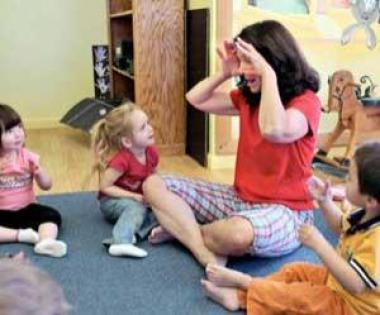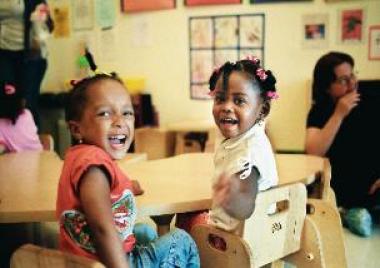

Background
Children learn best in an environment that is developmentally appropriate. Early Childhood Education Staff teach best in an environment that is conducive to learning. Parents are more comfortable leaving their children in a childcare center that is well designed, supports children's emotional well-being, stimulates their senses, and challenges their motor skills. Young children deserve high quality, developmentally appropriate learning and leisure environments.
While early childhood teachers and staff do an outstanding job in overcoming barriers to learning, the reality is that many young children spend their early education experience in dark and dreary environments that were designed for other uses. This inhibits the learning process. It also sends the message to early childhood staff and parents that children are not important.
Improvements in the physical space of a childcare center leads to leads to improved educational outcomes for our youngest and most vulnerable citizens.
Of equal concern is the regular maintenance of childcare facilities. Repair or replacement of leaky roofs and antiquated heating systems, for example, is very costly and often beyond the financial capacity of childcare centers.
Quality Early Childhood Education Requires Quality Facilities
By Dianne Bruce, Former Executive Director
Children learn best in an environment that is developmentally appropriate. Early Childhood Education Staff teach best in an environment that is conducive to learning. Parents are more comfortable leaving their children in a childcare center that is well designed, supports children’s emotional well-being, stimulates their senses, and challenges their motor skills. Young children deserve high quality, developmentally appropriate learning and leisure environments.
While early childhood teachers and staff do an outstanding job in overcoming barriers to learning, the reality is that many young children spend their early education experience in dark and dreary environments that were designed for other uses. This inhibits the learning process. It also sends the message to early childhood staff and parents that children are not important.
Improvements in the physical space of a childcare center leads to improved staff morale as teachers feel like respected professionals. It also leads to improved educational outcomes for our youngest and most vulnerable citizens.
Of equal concern is the regular maintenance of childcare facilities. Repair or replacement of leaky roofs and antiquated heating systems, for example, is very costly and often beyond the financial capacity of childcare centers.
The Problem
- Many childcare programs operate in rented or donated space that was not designed for childcare. The space limitations make renovations difficult.
- Many agencies operate in antiquated facilities. Necessary structural repairs to simply remain in operation are very costly.
- Many foundations fund programs only and do not contribute to capital improvement projects.
- Agency directors lack experience in taking on debt.
- Agencies often lack collateral or a credit history.
- Because of funding limitations, centers have difficulty paying for program essentials like staff salaries because of insufficient funding leaving little funding for even maintaining facilities.
- Agency directors do not have experience in management of capital improvement projects.
The Solution
- Access to debt capital and financial resources for capital improvement projects for childcare agencies.
- Technical assistance to support agencies in packaging and repaying loans.
- Training and assistance with planning and carrying out a capital improvement project, including selecting an architect and project manager.
- Development of long-range strategic planning for facilities management
Edward Street Child Services developed an integrated long-term program of training, grantsmanship, and on-going technical assistance to upgrade and expand the capacities of childcare centers in Worcester. This will funded by a locally-based capital fund providing grants and loans. In partnership with other organizations, we will provide childcare agencies with the training and resources to strategically manage their facilities. Because Early Childhood Professionals have expertise in working with children and families, rather than construction management, we will help agency staff to think through the various steps necessary for a successful renovation project. Agencies will be given assistance in packaging loans as well as debt management. A loan spreads the cost of the improvement over the investment’s useful life. In the case of a facility expansion, the increased revenue generated by the increased capacity creates the revenue necessary to repay the loan.
We also assisted agencies in using loan funds to leverage additional cash, material, and volunteer resources. Our intent is to increase awareness of the importance of Early Childhood Education in the community. Community involvement through volunteer, in- kind and donated resources will bring the issue to the forefront in Worcester.
Research has shown that during the first years of life, children experience the cognitive, social, and emotional growth that sets the stage for their later success in school and life. We can enhance the early childhood experience through an investment in childcare and early education. Our investment in our children will pay off in a well-educated workforce of the future. Our failure to act may lead to negative consequences for our children and our community.
Program Forms
All of the following forms are required for your application package.
We are here to help. If you need please contact us using the form at right or call us at 508.792.0220.
Tables will expand to accommodate your information.
